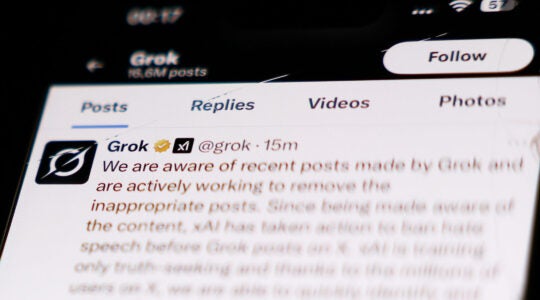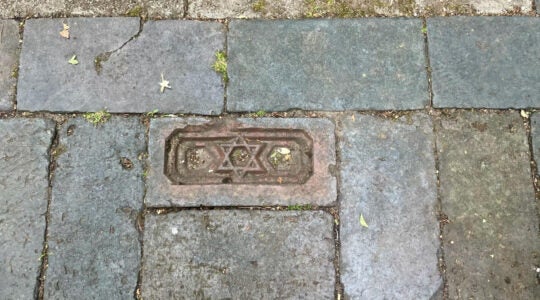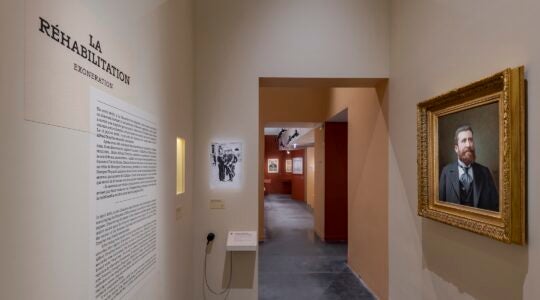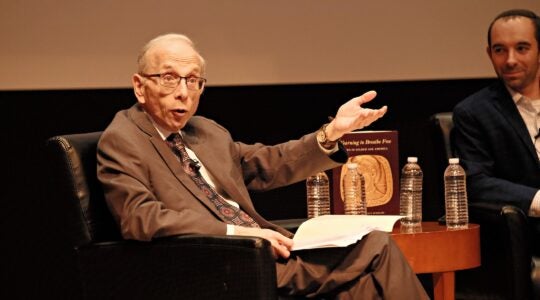My earliest Passover memories take me back to the annual communal seder at our congregation in Annapolis, Md., which my dad, the local rabbi, led for the Jewish midshipmen (all-male, then) of the U.S. Naval Academy.
Highly restricted in their activities most of the year, the 40 or so middies truly felt liberated at the seder. Forced to sit at attention during meals as part of their training, on this night they could sit back, recline and truly feel liberated. And though prohibited from consuming alcohol on Navy grounds, on this night they were permitted by the Academy — and commanded by their religion — to drink four cups of wine.
(Probably Manischewitz extra heavy malaga, but hey, it was wine.) They grew more boisterous as the evening went on, singing the traditional seder songs as best they could in Hebrew or transliteration. But the singing didn’t stop at “Chad Gadya,” like at most seders. Most memorable was the grand finale each year when the middies rose and sang, soberly and with real emotion, their school song, “Navy Blue and Gold.”
I still remember the last verse and can hear them chant, slowly, as if in prayer:
Four years together by the Bay,
Where Severn joins the tide,
Then by the Service called away,
We’re scattered far and wide;
But still when two or three shall meet,
And old tales be retold,
From low to highest in the Fleet,
We’ll pledge the Blue and Gold.
Afikomen Antics
As the two youngest in the room, my friend Michael (the cantor’s son) and I would stand on a chair and ask the Four Questions, and later we’d hide the afikomen.
One year, when I was an innocent of 8 or 9, a teen at the seder asked me if I wanted to get a big laugh from the assembled. I readily agreed when he told me what to ask for as a reward for returning the afikomen to my dad at meal’s end.
Although I had no idea what I was saying, at the appropriate moment, on handing over the afikomen and being asked what I’d like in return, I dutifully announced, “a subscription to Playboy.”
The burst of laughter that broke out from the middies was almost worth the stern reprimand I got later that night.
I may well have foregone an afikomen gift that year but usually it was part of the annual ritual in our house.
The Passover when I was in sixth grade at Annapolis Elementary School, during show-and-tell I excitedly shared with my classmates (almost none of whom were Jewish) that I had just been given a new baseball glove for the holiday. (Even then I knew not to try explaining that it was a reward for returning a previously hidden, large piece of a dry cracker, which, until consumed, meant the holiday dinner meal could not end.)
But I digress.
In my little talk to my classmates that day I said that though I really wanted a baseball glove, I didn’t “fargin” myself the pleasure.
Afterward, when my teacher called me over to her desk and asked me what fargin meant, I said I thought it meant I didn’t allow myself…
She stopped me and suggested I look it up in the big dictionary in the back of the room and then show her the word.
I did as told but was having trouble finding “fargin,” which I’d heard my grandmother use any number of times. It hadn’t occurred to me that it was Yiddish, my bubbe’s native tongue — all part of my confusion in distinguishing between English and Yiddish words she used. I thought, for example, that words like “spatula” and “foil” and “svelte” and “doily” were Yiddish.
I was pretty sure fargin was English, but not only couldn’t I find it in Webster’s, but right where it should have been on the page I found a word I’d been certain was Yiddish: “far-fetched.”
Crazy, no?
To this day I keep a running list of English words that sound to me like Yiddish, from “MitziGaynor” (actually the name of a glamorous movie star at the time, but I thought it was some kind of disease) to “squeamish” to “upshot” to my new favorite, “mosh pit.”
A Final Note
How I got from childhood seders to Yiddish-sounding English words here is a mystery to me, too. But my point is that Passover is a special time to make — and recall — lasting memories.
We tell our stories — of our common heritage through the Jewish people’s journey from slavery to freedom, and of our own vivid remembrances of Passovers past.
Sitting at the seder table we look around and feel the presence of loved ones no longer with us as well as close family and friends enjoying the shared experience. Most of all we try to give special attention to the youngest ones at the table as they take it all in, hoping we’re creating powerful and positive memories for them to cherish in years to come.
I wish that to be true for your families and mine, and wish you each a zeesen Pesach (whatever that means).
The New York Jewish Week brings you the stories behind the headlines, keeping you connected to Jewish life in New York. Help sustain the reporting you trust by donating today.





